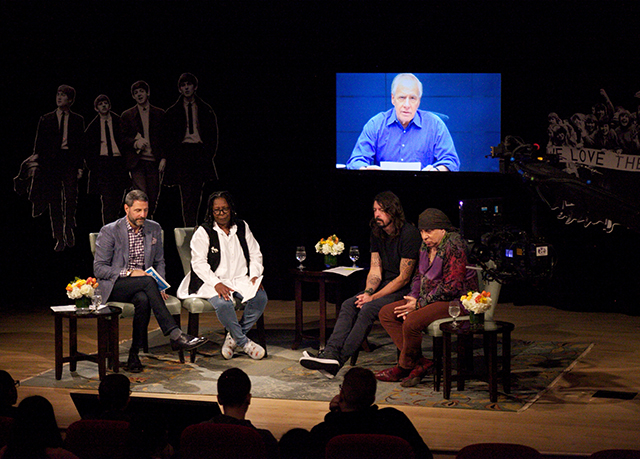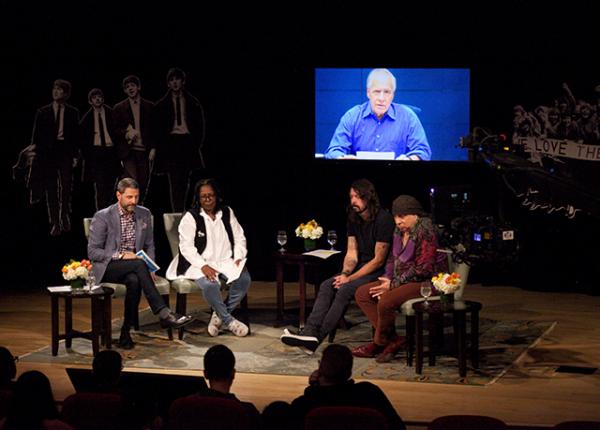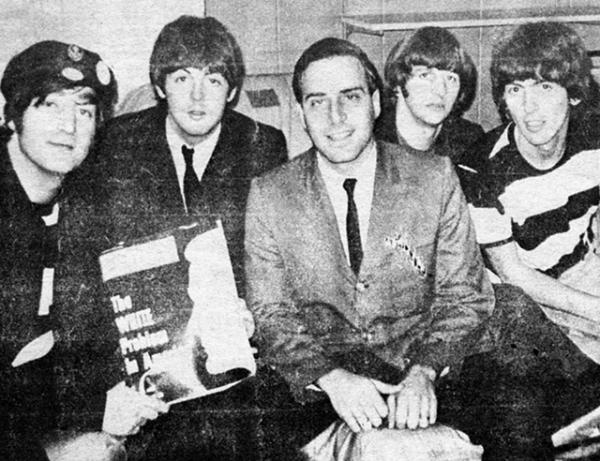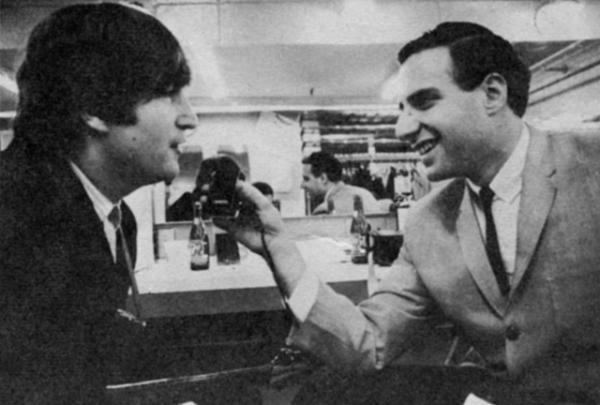KID REPORTERS’ NOTEBOOK
An Amazing Ride With the Beatles


Left to right: Scholastic Vice President Billy DiMichele, Whoopi Goldberg, Dave Grohl, and Stevie Van Zandt talk about the influence of the Beatles at a Scholastic event celebrating the British rock group's influence. Larry Kane shares his thoughts via satellite.
Beatlemania is defined as extreme enthusiasm for the Beatles, the British rock group that took the world by storm in the 1960s. When John Lennon, Paul McCartney, George Harrison, and Ringo Starr, nicknamed the “Fab Four,” arrived in the United States in 1964, fans across the country went wild. Today, more than 50 years later, they are the best-selling musical group of all time in the U.S.
A new documentary by Ron Howard, The Beatles: Eight Days a Week—The Touring Years, chronicles the band at its height in the mid-1960s. Journalist Larry Kane was lucky enough to cover the Beatles when they toured the U.S. in 1964 and ‘65. In a recent phone interview, Kane shared his recollections of that magical time and talked about the band’s influence on music, fashion, and culture. Below are excerpts from our conversation.
How did you get the chance to accompany the Beatles on tour?
I wrote a letter to their manager, Brian Epstein, and asked for a single interview in Jacksonville, one of the tour stops. It was the city closest to Miami, where I was living. Shockingly, I got a letter back inviting me on their entire tour—their planes, their cars, and their hotels.

Journalist Larry Kane (center) with the Beatles (left to right: John Lennon, Paul McCartney, Ringo Starr, and George Harrison) in the 1960s. When the Beatles toured the United States, they refused to play in venues that were segregated.
I took it to my bosses and said that I didn’t want to go. The reason I didn’t want to go was [because of so much else going on]: The war in Vietnam was escalating, racial tensions lay across the country and in my own hometown, Miami, Cuban refugees were coming in by the thousands every week. I felt that it was really a bad assignment for a serious news guy to travel with a band that would be here in September and gone by December.
As you can tell, I was wrong. Finally, my bosses convinced me to go. Within several weeks, I was explaining to people that it was the most stunning and shocking thing I had ever covered. Basically, it signified a revolutionary change in the social culture of the world. Little did I know what I was getting into. It was very exciting.
What was it like getting to attend every Beatles concert during those years?
Sometimes, I would sit by the stage or stand by the stage. Other times, I would go up into the crowd. For example, the Beatles played in the Boston Garden, and it was not air-conditioned. I went into the stands to watch the crowds to see what they were like. I did this at almost every concert. Try to understand this: Every person who was looking at the Beatles, especially the young girls, was convinced that the musicians were singing exactly to them. The most amazing part was seeing how feelings for the band transitioned from this incredible fan explosion—electric exuberance, enthusiasm, and exhilaration—to love of the Beatles’ music.

Journalist Larry Kane interviews musician John Lennon, who co-founded the Beatles, in the 1960s.
My mother said, “This is going to be the biggest thing you ever covered.” My father had a different point of view. He pulled me aside before I left and said, “Watch your back. These guys are a menace to society.” He felt that their hair and the way they carried themselves was dangerous. The Beatles were not a menace to society, but I did get bounced around a lot on that first trip. There were a lot of black and blue marks, a lot of crowds, and there was tons of excitement. After the first trip was over, I couldn’t wait to go on the second.
What are your favorite memories of traveling with the Beatles?
Most of all, the kind of people they were. After they somehow found out that my mother had passed away, John and Paul came over to comfort me. Paul had lost his mother when he was 14, and John had lost his mother when he was 18, so they knew what it was like, and they were very comforting.
Every night, I watched them go up to the front of the plane and talk to the entertainers who opened for them. These entertainers were very talented people, but nobody listened to them because the kids just wanted them out of the way. The crowd would scream, “We want the Beatles!” The entertainers didn’t feel appreciated, but John, Paul, George, and Ringo encouraged them. I thought that for four guys, ages 20 and 21, it was pretty amazing that they had the maturity and sensitivity to do that.
They also handled themselves beautifully with a pretty nasty press who made fun of them. I think that’s why I got along with them. I didn’t ask them silly questions like what did they eat for breakfast, or did they wash their hair, or what did they like in a girl. I asked them about things happening around the world. Even though I looked like a nerd from the 1950s, as John said, they got along with me in a very special way.
What else was going on in the U.S. and the world during Beatlemania?
It was a scary time. President John F. Kennedy had been assassinated on November 22, 1963, and a new president [Lyndon B. Johnson] had taken over. The country was in a state of shock.
There was a tremendous amount of action in Florida, where thousands of people were coming over by boat to escape dictator Fidel Castro in Cuba and all the murder that was going on there.
The U.S. was having economic difficulties. Young men were getting drafted to go to war in Vietnam. The Beatles were basically a tonic, a way for people to become happy after going through all this bad news from November 22 on.
In the U.S., the band was welcomed with open arms. They were shocked because back in England, the biggest crowd they had performed for was maybe 2,000 people. They came on the American stage, and they were looking at 19,000 or 25,000 people a night.
In 1965, the Beatles performed in front of 54,000 people at Shea Stadium in New York City. It was an amazing sequence of events, watching them break into society and have such a cultural impact.
The Beatles did not know in 1964 or 1965 that they would become the icons and legends that they are today. They thought that they would have a few good years, make some music, and go off on their own to make their individual music. No one could possibly know that we would still be talking about them all these years later.
Still, their manager, Brian Epstein, said to me, “Larry, you watch, the children of the 2000s, of the next century, will be listening to the Beatles.” I thought he was crazy.
What are some of the ways that the Beatles had a lasting influence on American music and culture?
They were a liberating force. In the 1950s, women were not expected to show their emotions in public like that. They were not expected in any way to show emotions of romance—pulling at their hair, grabbing at their clothing, and tears flowing down their faces. This wasn’t what it was all about. The Beatles ushered in a new era of liberation. They also made people rethink fashion. By 1968, long hair was a big deal for men.
The Beatles changed the way we look at music, and they forged the way for hundreds of groups around the world to be successful. But the Beatles’ biggest legacy is that all these years later, their music endures. It seems as alive and relevant today as it was back in the 1960s.
What was the band's greatest strength?
During the height of their success, during their touring years, they were able to stick together like brothers. When one was feeling lousy, the other would pick up his spirits. As entertainers, they were the best band that ever played on a stage. They sounded on stage exactly as they did on the record. They were a great touring band. They had remarkable music, and music that reverberated through so many decades. Even today, when you listen to a song—“Imagine,” “Penny Lane,” or “A Day In the Life”—it becomes a part of you and stays with you. But their greatest strength was their ability to draw the world together with a shared experience, something that everybody could enjoy together. Listening to their music was an experience shared by millions of people around the world.
Can you tell us something about each of the Beatles that our readers might not know?
John Lennon was a man who said in public what he thought in private. That can be very refreshing, and it can also be very dangerous. He was honest and forthright. He was very committed, especially about such causes as poverty and racism. He and Paul and the rest, when I told them that the Gator Bowl in Jacksonville was segregated, they refused to play there, and eventually it was integrated. John was a man of deep principles. He was a great reader, a poet, and really a Renaissance man, He did everything. He could be very tough. He and I developed a very close relationship until he died in 1980.
Ringo Starr was probably the most misunderstood Beatle. He was the second most intellectually curious of the Beatles. He loved to talk about war and peace. You’ll notice every time you see him, he’s got his hands up with the peace sign. He was a wonderful guy with a great sense of humor and was absolutely wonderful to travel with. Of all the Beatles, he was the most low-maintenance. He didn’t need a lot of attention. He just loved being there.
George Harrison was a person who people said didn’t say much, but I would disagree with that. When he did say things, they were usually pretty profound. For example, once we were coming into the airport in Portland, Oregon, and one of the plane’s engines was on fire. There were fire trucks down below, there was foam on the runway, and there were ambulances waiting. George yelled out to me, and repeated it the next day on tape, “Larry, if anything should happen on this plane, it’s Beatles and children first.” He had a great sense of humor. He was also very spiritual and mystical. He was a delight to be around.
Paul McCartney never met a comb, microphone, or mirror that he didn’t like. He loved to be on stage and still loves the feeling of connection with the audience. I’m telling you that the reason he still tours around the world, besides making a lot of money, is that he loves the contact with people. Of the four, he was the one who wanted to be on stage the most, who wanted to entertain the most. He was the one who was totally immersed in the music and majesty of the moment. He also was a great healer. He knew how to make people feel good and still does that very much today.
John and George are not here anymore, but their memory and voices live on. The two who are here are doing a lot for charities and communities, setting an example for the rest of the world.
Why do you think the Beatles are popular with every new generation that comes along?
Because they are good. They were just four guys who learned how to perform together, relying on great chemistry and steadiness. I personally believe, and I couldn’t have said this back in 1970 or 1980, or even when I was with them, that they are the greatest band of all time. They are right up there with the classics. You can look at the number of songs they wrote compared to Beethoven and Mozart, and they wrote more songs than both. In fact, John and Paul wrote more than 300 songs together.
How did covering the Beatles help shape your career?
Covering them on tour changed my life in the way I saw things. It taught me how to travel and get three hours of sleep every night. It taught me about reporting on the road, which I did more of later in life, in war zones and difficult situations. I learned from John Lennon about being more candid. I got very well known in radio because my reports were broadcast in 50 stations around the world. They were syndicated. A lot of stations got to know me, including one in Philadelphia, and they hired me as their assistant news director. I came up here, and a year later I started doing TV reporting. In 1969, at the age of 26, I became the anchorman at the television station. I’ve spent the last 37 years as a TV anchorman at all three news stations in Philadelphia.
